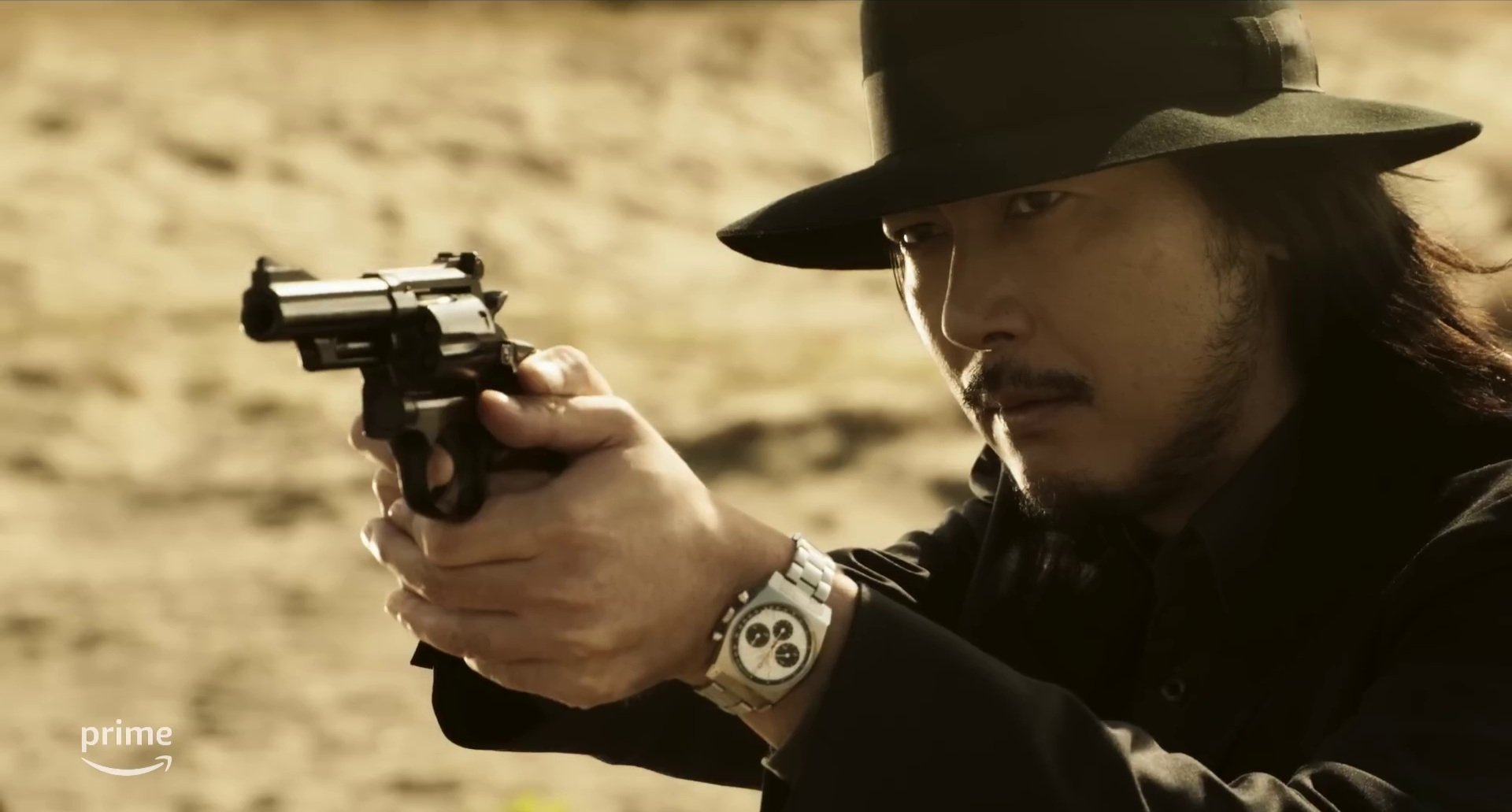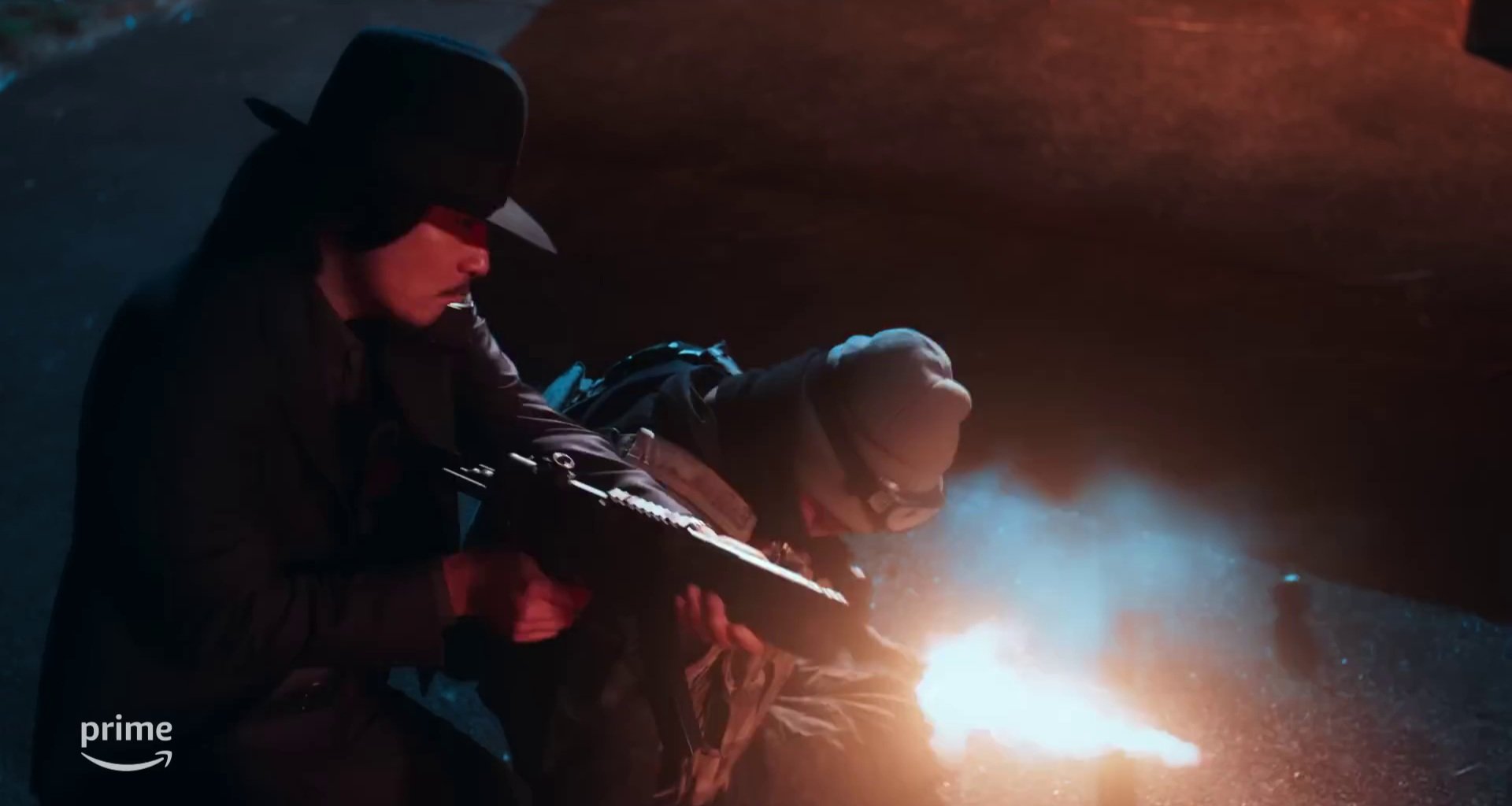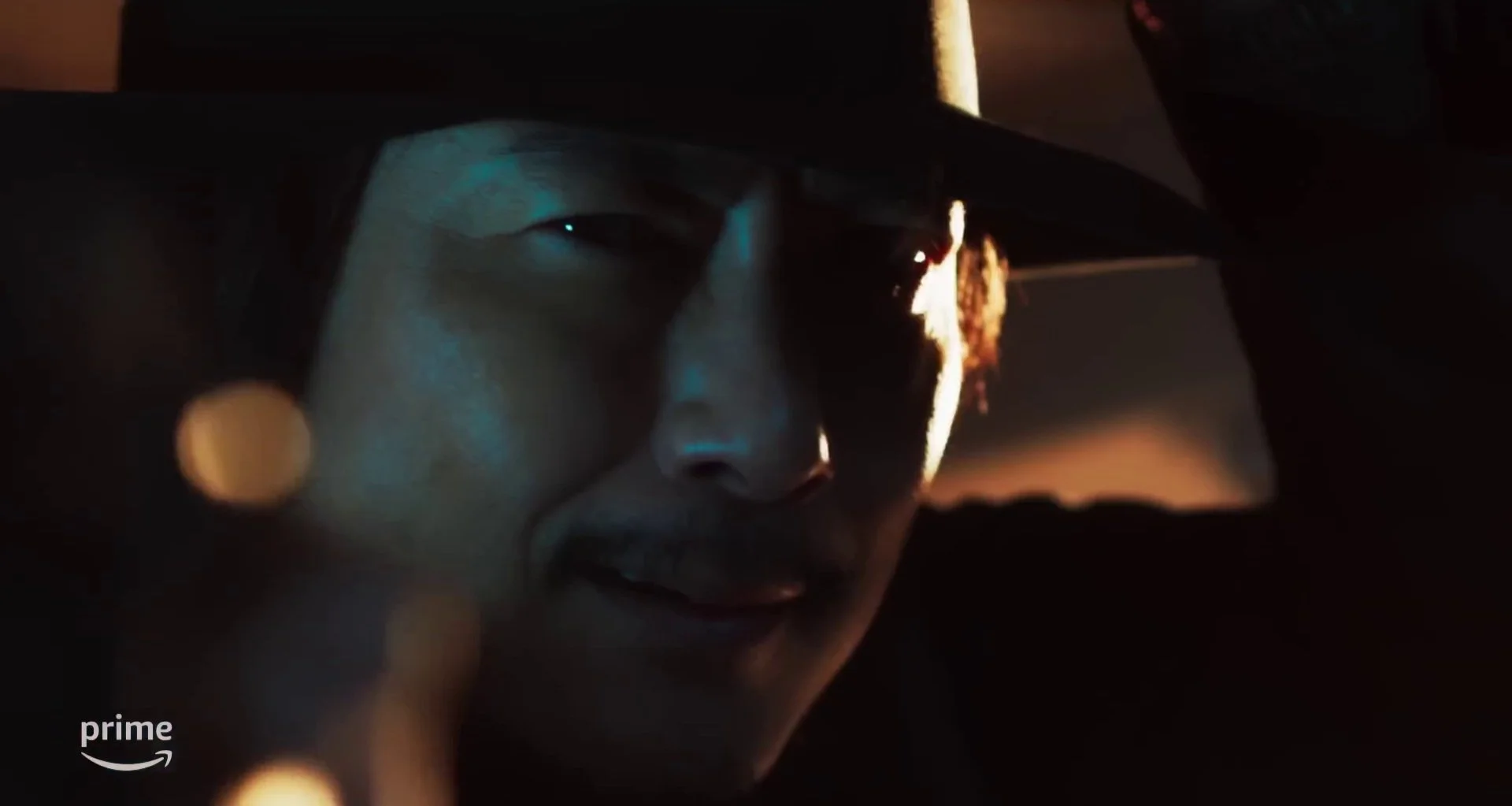Review: Jigen Daisuke (2023)
Welcome to our review of the 2023 released Jigen Daisuke, a live action spin-off film in the Lupin III franchise from TMS Entertainment and Amazon Prime Video!
Before continuing, please note that this review contains spoilers.
Please only read on if you either have seen the film already, or do not mind learning about important character interactions and pivotal plot points in advance.
Upon first reading the announcement of Jigen Daisuke, I felt apprehensive.
The Lupin series, although taking many different approaches to its storytelling over the years, had not yet received a truly stellar live action adaptation. Sure, I would happily step into the ring and take punches for 1974s Strange Psychokinetic Strategy no matter my opponent - however, that film is a different beast. A tongue-in-cheek comedy that, to modern eyes, feels more like a playful throwback to the sillier side of Japanese cinema in the mid-70s than anything else. It is genuinely funny and a rollicking good time - but it shows its age, and can be difficult to recommend to newer fans of the series.
Much closer to what we can expect from modern Lupin is Ryuhei Kitamura’s 2014 released live action adaptation. While it featured a star-studded cast, including Shun Oguri and Tadanobu Asano, I found myself feeling disappointed on release. Its costume design is on point, and it keeps many of the same tropes, but to me, it came across as boring, mostly due to what I felt was poor pacing, an uncompelling cast of side characters, and a weak final act.
Thankfully, despite going in with low expectations, I found myself pleasantly surprised watching Jigen Daisuke over the weekend. In fact - more than that. To me, this new direct to streaming film felt up there with some of the stronger Lupin III works of the past decade or two, and in particular, felt like a perfect companion piece to the Takeshi Koike spin-off series, Lupin the IIIRD.
A little under two hours in length, Jigen Daisuke follows the adventures of our titular hero (played by Tetsuji Tamayama) as he attempts to fix his trusty combat magnum. His search ultimately takes him to Japan, where he seeks the once legendary gunsmith Chiharu Yaguchi (played by Mitsuko Kusabue). Much to Jigen’s dismay, Yaguchi is retired from her days in the arms business, and is now running a (far more legal) watch repair shop in its place. The pair quickly bond, and things take a turn when Oto (played by Kotoka Maki) - a young girl with the inability to communicate through speech - shows up on their doorstep.
It transpires that Oto, along with several other children, are being sold on the black market, and their blood is being used to create a drug that slows down ageing. Behind the drug is the beautiful but deadly Adel (played by Yōko Maki), a powerful force in the criminal underworld who despite being wheelchair bound, is not to be messed with (hell yes, badass disability representation). Her right-hand man, Takeshi Kawashima (played by Masatoshi Nagase), roams the slums beneath the great tower in which she and her family reside. Like any good Lupin villain, Kawashima has a special ability that sets him apart from the rest and makes him a worthy opponent for Jigen - the power to “shapeshift” and don the likeness of others.
If you are already familiar with the Lupin franchise, none of this will sound unusual. As mentioned earlier, this could well be the narrative of any Takeshi Koike directed feature film, and I would hazard a guess that it is there where this live action found its inspiration (with further proof being James Shimoji on soundtrack duties, and he does another killer job with it, at that).
While the plot may sound goofy on paper - and at times it feels that way in the film itself also - there are a few scenes related to all of this that may be considered distressing.
This is dark Lupin. It’s the sort of film, much like The Woman Called Fujiko Mine series or those Takeshi Koike features, that should probably come with a trigger warning.
It covers childhood trauma, has plenty of gore, and also the mistreatment of children. It is not afraid to cross the line, but not in a way that to me, felt distasteful. If anything, the darker moments in the storyline felt like a method of exploring Jigen’s character in a way the anime has not often done. We see Jigen in vulnerable and emotional states here, reacting to Oto’s mistreatment and the reality of the situation in a way that would be difficult to do in animated form. Jigen’s face as he reads Oto’s writing in his notebook, describing her childhood, how she was beaten, how her mother was murdered before her eyes, and what fate awaits her once she is abducted again, really is a picture that paints a thousand words.
While he has nailed the action sequences and certainly looks the part, it was during this scene that I really fell for Tamayama. He is a flawless Jigen. He can successfully portray all versions of the character - the cool, hardened hitman, the romantic, compassionate companion, and the goofy, stay at home mom. I was impressed by his take on the character in the 2014 live action film, but his focus in the spotlight and the improved writing here allows him much more time to shine.
Speaking of those action scenes - the film is full of them.
Single-handedly taking down a whole army of guards to get to Adel in the films third act, our hero is not to be trifled with, and with a hand on his hat at almost all times, Tamayama does look the part, even when things escalate. And escalate it does - to the point of ridiculous, at times. From, firing bullets through a concrete wall to take down a guard on the other side, to using one of their bodies to suppress a grenade explosion (which sends the both of them flying into the air) - if you have come for action, action you will get. Yes, the film does not have the budget of a John Wick, but I’ll be damned if it does not make the most of what it does have.
I could spend all day writing about these amazing sequences - but to keep things short, two shots in particular stood out to me. The first is as Jigen approaches Adel’s tower, and fends off guards, who are attacking him while he works his way through the slums below. Out in the open and confronted with a group of menacing soldiers armed with assault rifles, the gunman thinks on his feet, and slams a metal barrel down onto the ground. Leaping after it, he hits the floor, and rolls along behind the barrel. The camera shows this in a shot made up of three layers - Jigen at the forefront, rolling along the ground, with the barrel above his head, also rolling, and his attackers above that. It has the same silly logic as the anime and is not realistic, but who cares? This scene was a lot of fun, and holy cow - it looks great.
The second shot is during Jigen’s first encounter with the shapeshifting assassin, Kawashima. The fighting here, as it is inside the watch lady Yaguchi’s residence, is done in particularly tight spaces. After fending off three goons thanks to some trickery with a gas pipe, Jigen comes face to face with Kawashima. The deadly Kawashima is wearing a unique looking long black jacket, almost cape-like in appearance. This is cleverly used throughout the film as a neat way of telling the viewer that, despite assuming a different identity, the character on screen is indeed Kawashima. Here, it is used in a slightly different way, as it conceals a captured Oto, who when revealed, stops Jigen in his tracks.
It’s a sinister scene, that shows a creepy and cowardly Kawashima, hiding behind the life of a child, literally merging into the shadows, and disappearing into the darkness of the house. It’s helped by some superb lighting, and Kotoka Maki’s excellent performance of Oto, whose tear-stained face lets out a soft “I’m sorry”, the first two words she has said throughout the film up to this point.
Further on in the film, during their final encounter, Kawashima admits to Jigen that he has spent much of his life an outcast, and that even his most trusted co-workers have found him to be creepy, choosing not to engage with him.
After this moment in the film, I can certainly see why.
On a lighter note, I must give a shout out to the fantastic supporting cast. The watch shop that Jigen visits sits on a cosy shopping street, and the residents that work there often pop in to lighten the mood. It feels as if they are a genuine, supportive community, and they help create some touching moments between Jigen and the young Oto. Yaguchi’s neighbour, an older gentleman that stops by to check in on his friend, has a silliness in the way he speaks and acts that reminded me of the late Yasuo Yamada. His performance really helps lift spirits after some of the heavier scenes.
There is also an incredibly flamboyant and excitable arms dealer, that fronts as a florist. As Jigen and his informant stand in a darkly lit car park in the dead of night, suspiciously waiting for their goods, he screams onto the scene in his little van, so colourful it is likely visible from space. He jumps out and hands his client a basket of flowers, with bundles of ammo hidden in the base of it, before whizzing off screen again, leaving a confused Jigen behind.
Moments such as this really help break up the film, and they are part of the reason as to why the runtime flew by for me. Everyone is a joy to watch on the screen, and much like Jigen, I felt so much happiness seeing Oto’s huge grin in one of the film’s final shots. Maki plays the character so well, despite her young age, and by the end of it all, I was left smiling too.
This film is a fantastic surprise, and one I can only recommend.
There are a couple of moments where its lower budget does show - in one shot involving Kawashima’s face camo tech (this really should have remained smoke and mirrors, like in the rest of the film) and the final battle with Adel, blasting out of the window and falling down the tower. Overall, though, the set design is great - and it certainly does not skimp on the action and the cast. Even the shapeshifting Kawashima alone takes the form of around nine different actors and actresses, an incredibly brave decision considering their constraints.
I think the biggest point of contention it may have amongst fans is how much it does differ to the 2014 live action, which was far more light-hearted. This grittier, bloodier story, in my opinion, fits the character of Jigen and Tetsuji Tamayama well. The film does its own thing, whilst still feeling authentic to the source material. This is no doubt also in part thanks to the stellar soundtrack of James Shimoji, which adds the cherry on top of the cake, and helps make this feel as if it can sit perfectly alongside Jigen’s Gravestone or Fujiko’s Lie.
I’m excited to see what the future holds for TMS and Amazon, and would not be against more live action adaptations. Perhaps we can get Ryohei Suzuki back as Inspector Zenigata. Please? Pretty please?


















